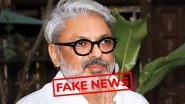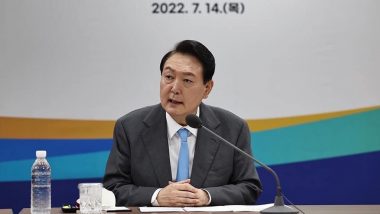Seoul, December 7: South Korean President Yoon Suk Yeol on Saturday narrowly escaped impeachment over the outrage following his brief declaration of martial law. The National Assembly voted on the opposition-led motion, but most lawmakers from Yoon's ruling People Power Party (PPP) boycotted the vote, despite massive protests outside the parliament, YONHAP news agency reported.
Yoon had earlier apologised publicly for his martial law declaration, stating that "he will leave to the ruling party decisions about his term and stabilisation of state affairs." South Korean President Yoon Suk Yeol’s Impeachment Over Martial Law Declaration Fails As His Ruling Party Boycotts Vote.
The PPP lawmakers largely stood by their party's stance to avoid a repeat of the 2016 impeachment crisis of President Park Geun-hye, which led to a conservative party divide and a liberal victory in the 2017 presidential election, as per YONHAP news agency.
Following Yoon's martial law decision raised serious questions about his ability to govern for the remaining half of his single, five-year term. Now he legal risks and renewed attempts to force him out of office as the main opposition Democratic Party (DP) said "it will table the impeachment motion again next week." South Korea Unrest: President Yoon Suk Yeol Apologises for Causing Anxiety With Martial Law Declaration Ahead of Impeachment Vote.
According to YONHAP news agency, hundreds of thousands of people gathered outside the National Assembly on Saturday, calling for President Yoon Suk Yeol's removal from office. This comes after Yoon's attempt to impose martial law, which has sparked widespread outrage.
Prosecutors, the police and the Corruption Investigation Office for High-ranking Officials have all launched probes into Yoon and senior officials involved in the martial law decree, seeking to press charges of insurrection and abuse of power, among others.
DP leader Lee Jae-myung has accused Yoon of being "the mastermind behind rebellion," calling for authorities to take necessary procedures for a swift investigation into him. Under the law, crimes of rebellion are exceptions to the presidential immunity to prosecution, as reported by the YONHAP news agency.
Notably, South Korea is facing a challenging time, with some lawmakers proposing a constitutional amendment to shorten President Yoon Suk Yeol's term and transfer more power to the prime minister, the government's No. 2 post, who holds a largely ceremonial role.
The political turmoil comes at a challenging time for South Korea, as it is working to strengthen alliances with the United States and other partners to counter growing threats from North Korea amid its deepening military ties with Russia. Yoon had planned to meet Trump shortly after his inauguration on Janurary 20, but that prospect now seems uncertain, the YONHAP report added.
(The above story is verified and authored by ANI staff, ANI is South Asia's leading multimedia news agency with over 100 bureaus in India, South Asia and across the globe. ANI brings the latest news on Politics and Current Affairs in India & around the World, Sports, Health, Fitness, Entertainment, & News. The views appearing in the above post do not reflect the opinions of LatestLY)













 Quickly
Quickly


